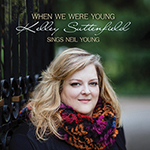Karen Oberlin
Bad Love: The Randy Newman Songbook
Metropolitan Room, NYC, July 27, 2016
Reviewed by Elizabeth Ahlfors for Cabaret Scenes

Randy Newman’s songbook is in good hands. Karen Oberlin is a versatile singer whose clear tone and intense interpretations explore genres ranging from pop and jazz, standard lyrics, vocalese and bop. She has scrutinized songs by Elvis Costello, Joni Mitchell, various other songwriters and the hits of Doris Day. Settling now into the iconoclastic musical world of Randy Newman, she brings out his music about life and people, in her own way, with her own voice.
Of course, she does not sound anything at all like Newman, whose distinctive sardonic drawl, he has admitted, comes from his interest in the South, particularly New Orleans. (Interesting since Newman was born, raised, and still lives in Los Angeles). Oberlin, the daughter of classical musicians in New York State, has a pitch-perfect voice, mellow, and spirited. Yet she uses Newman’s conversational lyrics with her own sophisticated sense of phrasing to communicate his musical conversations of different people and their lives. Newman has written for films, the score for the musical Faust, songs harshly reflecting society today, and also some of the most affecting ballads. Oberlin touches on all these areas, choosing tastefully, with little patter to interrupt. Through songs, she brings out a picture of a fiercely talented musician reflecting the world and its people.
She opened with “I Love to See You Smile” written for Parenthood and delivered with a come-hither, finger-sapping sassiness. This led into the dark side with the speakeasy feel of “Easy Street” and “Lonely at the Top.” Her voice husky, she paired two rain-themed songs, one depressing, the other socially sensitive to the lost and lonely.
Oberlin connects to the stories Newman is telling, stressing both humor and hypocrisy found in historic books as reflected in “The Great Nations of Europe” and the squeamish feel of political extremists in “Political Science.
” (“Let’s drop the big one and see what happens”). She includes satirical songs that poke a sharp stick at contemporary events. The wounds of race opened wide with “Korean Parents.” She hits the core of Newman’s satirical works, the best being “Sail Away,” about a slave trader pitching the glories of America to Africans about to be enslaved. (“You’ll just sing about Jesus and drink wine all day/It’s great to be an American.”) It’s a bitter song with a glorious hymnal chorus.
Ballads are the high points in this show. With her nuanced clarity and sensibility, Oberlin is compelling, sometimes seeming to sink inside herself for the honesty she senses. Following pianist Tedd Firth’s exquisite instrumental medley from Ragtime, she sings the evocative waltz “One More Hour.” “When She Loved Me,” a song delivered by a discarded doll, is a bittersweet moment from Toy Story 2. “Losing You” is a heartbreaker and Oberlin brings out the palpable sorrow. Her encore, “Feels Like Home,” was intensely romantic.
Always praiseworthy is the imaginative accompaniment of musical director/pianist Firth and Steve Doyle on bass. Their support, and Oberlin’s exquisite tone and musical savvy, let the multifaceted range of Randy Newman’s songbook speak for itself.
A stand-out show.





